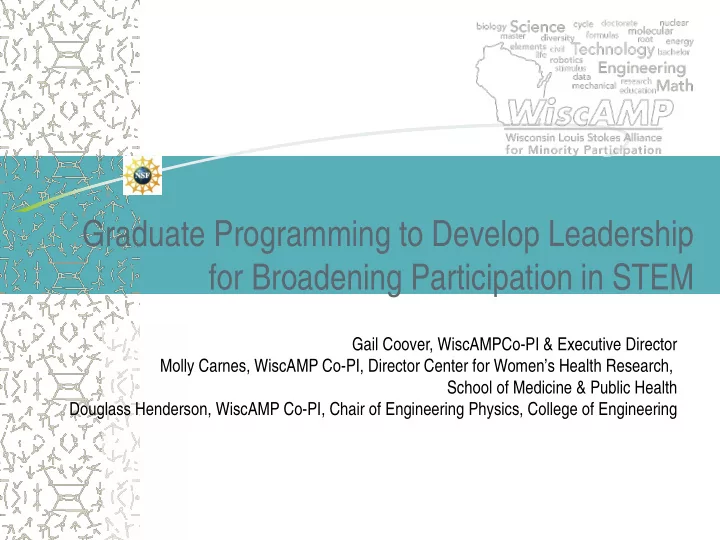

Graduate Programming to Develop Leadership for Broadening Participation in STEM Gail Coover, WiscAMPCo-PI & Executive Director Molly Carnes, WiscAMP Co-PI, Director Center for Women’s Health Research, School of Medicine & Public Health Douglass Henderson, WiscAMP Co-PI, Chair of Engineering Physics, College of Engineering
It takes a village! Industry Partners Graduate School College of Engineering NIH Wisconsin Center for School of Medicine & Public Health Education Research College of Agriculture & Life NSF Sciences School of Pharmacy DOE School of Nursing School of Veterinary Medicine DOD
Behind Every Successful PHD in STEM… Committed Faculty mentors Training program directors, coordinators and staff Family and Friends Supportive Community of Peers And???
Academic Research Career Ladder D EAN OR D IVISION F ULL P ROF H EAD OR A SSOC P ROF S CIENTIST OR A SSOC A SST P ROF S CIENTIST OR A SST P OSTDOC S CIENTIST G RADUATE S TUDENT
Research Career Ladder. NIH Award Types Center or Program Awards / R01 R01 R01 Career Dev. Renewals Renewals F32 Award/R01 Award (K) Postdoc Renewals Loan Fellowship D EAN OR F31 Predoc Repayment Or D IVISION Fellowship (LRP) F ULL P ROF T32 H EAD Or OR S CIENTIST Traineeship A SSOC P ROF T32/R25 OR A SSOC Traineeship A SST P ROF S CIENTIST OR A SST P OSTDOC Standard Grant / S CIENTIST G RADUATE Program or S TUDENT Standard Center Faculty Grant Award Postdoctoral CAREER Graduate Research Award Research Fellowships Fellowship Program NSF Award Types (GRFP)
Major Determinants of Advancement Grants Publications Training MENTORSHIP: Experience, Networking
Faculty Mentoring • Strong mentor relationships are critical determinants of career persistence and advancement in STEM • Mentors provide: • Resources (funding, space to do research) . • Opportunities (prof dev, conference participation). • Training (grant writing, manuscript writing). • Critical feedback (skills, knowledge). (Byars-Winston et al., 2015; Pfund et al., 2014; National Acad. of Sciences, 2007; 2010)
Catalyzing Impact of Grant Proposals… WiscAMP Bridge to the Doctorate (2015, 2016, 2018) Training, Education And Mentoring (TEAM) Science Grant (2008, 2012, 2016) Life Sciences and Biomedical Graduate Research Scholars (SciMed GRS) (2008) Graduate Engineering Research Scholars (1999) AGEP Proposal Planning with Richard Tapia (1998)
Original Program Model • Goal: to build a community of Graduate Scholars for the Professoriate • Recruitment of talented students • Community building and professional development activities for retention • Financial support and faculty commitment from the time of recruitment
Program Outcomes Total Master's and PhD Degrees at UW-Madison awarded to URM graduates in STEM by Year 80 70 60 50 40 30 20 10 0 2002 2003 2004 2005 2006 2007 2008 2009 2010 2011 2012 2013 2014 2015 2016 MS PHD
Diversifying the STEM Doctorate Percent of domestic PhDs awarded at UW-Madison to URM Graduates by Year and STEM Discipline Cluster 25.0% 20.0% 15.0% 10.0% 5.0% 0.0% 2002 2003 2004 2005 2006 2007 2008 2009 2010 2011 2012 2013 2014 2015 2016 Engineering Ag/Life/Bio Sciences Comp & Physical Sciences
Program Evolution • Formalized Mentoring Curriculum (TEAM Science & WiscAMP-BD) • 8 Core Competences & Individualized Professional Development Plans • Faculty Mentor Development • On-line training & resource materials • Norming • Career Coaches
Program Evolution • Research Efficacy • Coping Efficacy • Behavioral coping • Emotional coping • Leadership Efficacy • Science Identity
Research Career Ladder. Dependence on Mentors Decreases Going from Mentee to Mentor D EAN OR D IVISION F ULL P ROF H EAD OR A SSOC P ROF S CIENTIST OR A SSOC A SST P ROF S CIENTIST OR A SST P OSTDOC S CIENTIST G RADUATE Independence Increases S TUDENT Going from Mentored Researcher to Independent Investigator
Program Outcomes Scale range: Non 1 (strongly disagree) to 5 (strongly agree) Programmed Programmed I have a strong sense of belonging in my doctoral 3.46 3.44 training program Being a scholar is compatible with other aspects of my 3.19 3.50 cultural background I have a strong sense of belonging in my scientific 3.24 2.83 community I feel like I belong in my field of science 3.72 3.39 I am a scholar 4.29 3.78 My ethnic identity is an important part of who I am 4.43 3.39 My ethnic identity is an important part of my being a 3.86 2.83 scholar My gender identity is an important part of my being a 3.63 2.94 scholar Having more people with my cultural background (e.g., 4.01 2.83 race, ethnicity, gender, nationality) in my field makes me feel more like a scholar
THANK YOU! Gail Coover gcoover@wisc.edu 608-263-1138
Recommend
More recommend